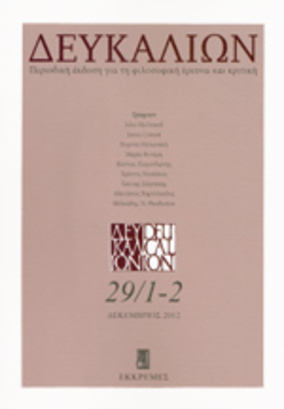Ηθικός σχετικισμός, αλήθεια και ορθολογική δικαιολόγηση στον MacΙntyre
Part of : Δευκαλίων : περιοδική έκδοση για τη φιλοσοφική έρευνα και κριτική ; Vol.27, No.1-2, 2010, pages 193-223
Issue:
Pages:
193-223
Parallel Title:
Moral relativism, truth, and rational justification in MacΙntyre
Author:
Abstract:
The concept of tradition in the work of MacIntyre concerns: (a) the moral life of a community (tradition), (b) the philosophical account which express it (tradition of moral enquiry). He argues that disconnected fragments of the earlier common public morality survive in the present, but lack the context from which they used to derive their meaning. The fragmentation of moral traditions is reflected in the traditions of moral enquiry. According to MacIntyre, when different traditions of moral enquiry are in conflict, there is no neutral way to judge between them or common criteria for determining the truth. MacIntyre, although he adopts the incommensurability thesis, which indicates the absence of common measure between different traditions of moral enquiry, attempts to avoid the conclusion that for this reason it is impossible to rationally justify amoral system over others. In the light of MacIntyre’s met theory, rational dialogue is possible between rival traditions of moral enquiry under epistemological crisis, when the one finds, on the basis of its own criteria, intersubjective valid within, a way out of the crisis in the light of the other tradition. I argue that MacIntyre is bound to cognitivism. From his criticism of emotivism, which he accuses for moral relativism, it follows that forhim moral judgments are not simply a matter of opinion, preference, desire or choice, but reflect the evaluative self-understanding of a particular community. His reference to community traditions aims at obtaininga substantive morality, which has a critical dimension, opposing the consecration of the moral conventions that constitute a particular tradition. For this reason he is trying to ensure conditions of criticism within the tradition and also that the change from one tradition to the other is subject to rational terms. MacIntyre’s account is based on his fundamental opposition to any effort of setting up “a view from nowhere”. However, the incommensurability thesis has too strong relativistic complications which cannot be resolved by his historicist epistemology. The intensity of his criticism against Enlightenment, followed by the adoption of the incommensurability thesis, causes an internal problem in his theory: insofar as itprones to relativism, his critique against emotivism is jeopardized. The enlightenment quest for common normative criteria, appropriate to regulate the rational dialogue between different traditions, remains meaningful
Subject:
Subject (LC):
Keywords:
MacIntyre Alasdair C.




